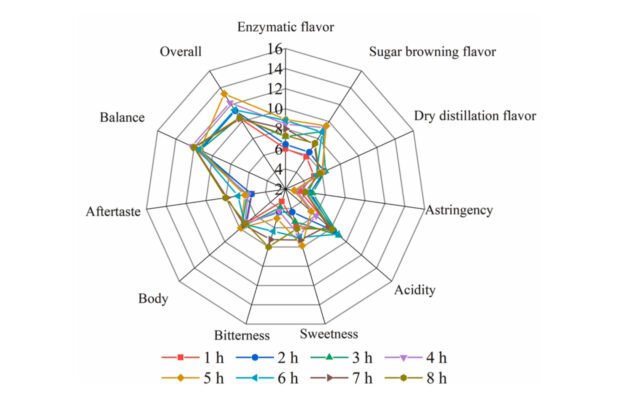[[{“value”:”
Researchers in China have discovered that cold-brewing coffee using a negative-pressure system can enhance the aromatics of the finished brew.
The study also examined how refrigerated storage affected the chemical properties of cold brew, revealing a decrease in aroma and antioxidant compounds over time.
Led by Yuqin Wang from the School of Grain Science and Technology at Jiangsu University of Science and Technology in Zhenjiang, China, the research was supported by a university-industry collaboration, with the authors disclosing no competing interests.
Sensory analysis of cold brew coffee with different extraction times. This image is shared via a CC BY-NC 4.0 DEED license. It has been formatted to fit this page. See the original image here.
Although academic research on cold brew is relatively new, following a period of rapidly escalating market popularity, this study adds to a growing body of sensory-related work, including recent efforts from researchers at the UC Davis Coffee Center and Thomas Jefferson University.
“Cold brew coffee is gaining popularity among consumers,” the authors of the new study wrote. “However, its extraction is time consuming and it has a short shelf life. This study employed negative-pressure extraction to reduce the extraction time of cold brew coffee.”
A diagram of the brewer employed in the study shows coffee being brewed at 6°C (42.8°F) through the use of vacuum pressure for a period of one to eight hours. The researchers found five hours to be the ideal brew time to capture desirable sensory characteristics.
Gas chromatography (A) and hierarchical cluster analysis (B) of the volatile compounds of cold brew coffee with different extraction times. This image is shared via a CC BY-NC 4.0 DEED license. It has been formatted to fit this page. See the original image here.
The study identified 94 volatile compounds in the brewed coffee — including furans, ketones, pyrazines, esters, aldehydes, azoles, pyrroles, phenols, pyridines, acids and alcohols — with concentrations varying based on the extraction time.
After roasting, grinding, and cold brewing the coffee, the researchers examined how its sensory-related physical characteristics changed during three months of refrigerated storage. Generally, compounds contributing to desirable aromas, flavor, and antioxidants decreased over time.
“These findings indicated that the deterioration of cold brew coffee might be caused by the degradation of aroma compounds, leading to changes in the coffee’s physicochemical properties,” the authors wrote.
By combining the results of their two main experiments — examining brewing method and time on sensory characteristics, and evaluating the loss of desirable characteristics during storage — the authors suggest cold-brewing coffee to achieve peak aromas may be a key to extending its storage life.
Physicochemical index of cold brew coffee stored at 4 °C for different days. A. pH; B. Total titratable acidity; C. Antioxidant activity (DPPH); D. Antioxidant activity (ABTS). Values are means and standard deviations (n = 3). Different letters indicate significant differences among samples (P < 0.05). This image is shared via a CC BY-NC 4.0 DEED license. It has been formatted to fit this page. See the original image here.
They wrote, “This study provides theoretical support for accelerating the extraction of cold brew coffee and extending its shelf life.”
The full study was published in LWT, a pay-to-publish title owned by Elsevier. Find the full study here.
Comments? Questions? News to share? Contact DCN’s editors here.
Related Posts
“}]]


